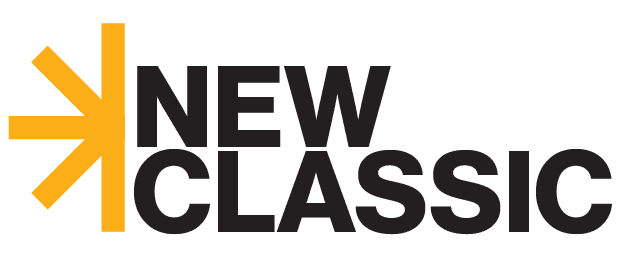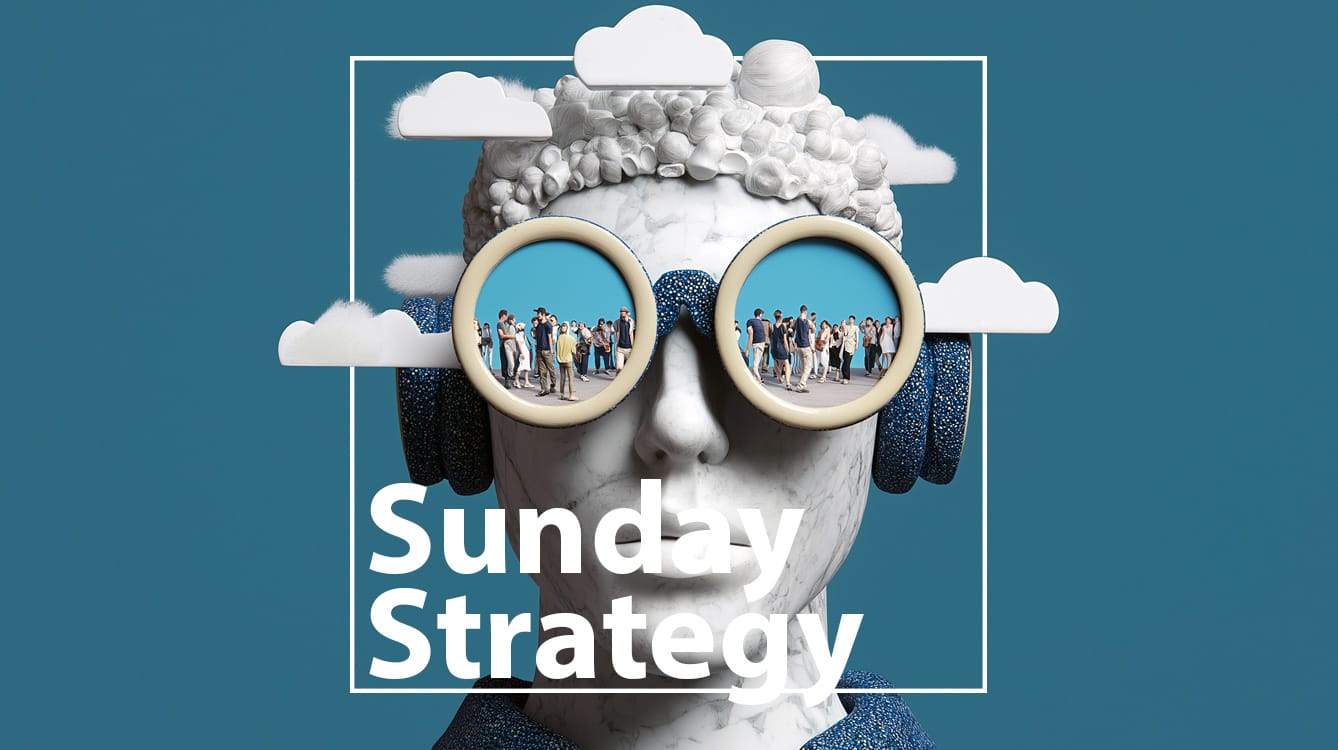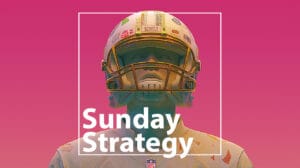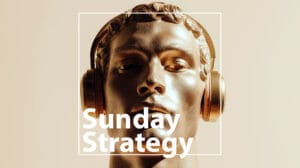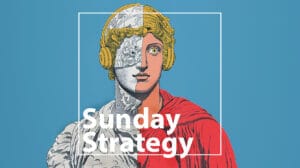In this issue of Sunday Strategy, we look at five stories to think about next week, including: Phases & Modern Comms Planning, AI Pricing, Summer Time Sadness, Home Cafes and Gen Z’s Distant Response to Remote Work.
In addition, we have ads from: Astronomer, Carer’s Trust, Samsung and McDonald’s UK.
If you’d rather listen to this week’s issue, check out our podcast episode below:
// Stories of the Week:
1.) “Phasing Out” Phases in Media Strategy
While “phases” are increasingly a forbidden word in media and comms planning, there is still a persistent belief that campaigns are consumed linearly. Pollyanna Ward has posted an insightful piece that reminds us that capturing fragmented and complex attention benefits from a clear and simple strategic response. We may not group campaigns in phases, but being clear about the tasks they achieve in disjointed or isolated consumption is key. Anything to stop anyone else from using the word “tease” or “reveal” in the year 2025.
2.) What We’re Getting Right and Wrong About AI Pricing.
Delta Airline’s investor announcement of plans to expand their AI pricing initiative to 20% of fares by the end of 2025, up from 1% currently, has sparked outrage and fear about the ability for the brand to price gouge customers – but how worried should we be? AI pricing, and subsequently AI wage setting, is certainly a real risk on the horizon. The signals we’ve created about our demand and needs are clearly available and AI pricing services are being developed and offered by companies from Mastercard through to JP Morgan and McKinsey. With a potential bill on the horizon in the US aiming to limit this technology’s implementation, ‘surveillance pricing’ is set to be a hot topic issue for years to come.
However, in Delta’s case, we may have jumped the gun with our fears. While the nightmare scenarios of price increases due to Delta’s awareness of a death in your family or a social post are possible, the business model and current reality of the airfare market may limit the incentive to develop this level of surveillance. If anything, personal demand seems to be one signal amongst a wider range of factors Delta considers.
Airfare, as Time points out, is cheaper than it has ever recently been, and airlines have adapted to make money through additional fees, credit cards, upgrades and more. The flight is currently the first cost, not the only cost. With massive variability in airline prices already and high competition on a lot of routes, the ability to squeeze more revenue through AI pricing for tickets may be limited. AI can’t take airlines back to greater ticket profitability. While loyalty programs previously locked travellers into an airline, creating a platform for greater gouging – this impact has decreased. The risk of AI pricing is real, but it might not be at our doorstep (or airport), just yet.
3.) Extreme Heat and Summertime SAD-ness
Extreme weather during US summers has had a surprising effect, in not just driving people to spend more time inside but also in changing our moods during the season. Seasonal Affective Disorder (SAD) is normally something seen in winter, as lack of sunlight is theorized to create changes in mood. However, as people change their schedules to be outside before the heat of the day, or stay inside to avoid it, a greater rise in summertime SAD is being registered. While we consider heat and extreme weather an environmental issue, this shows the long ranging implications climate change will have on our culture and health.
4.) Is The Hottest New Cafe in Someone’s Living Room?
Across North America and the UK, creators are turning their homes into pop-up cafés, complete with menus, branded merch, and themed events as a new manifestation of community and socializing. The movement, which sees social media creators telling the stories of their creations and ‘cafes’ seems to be a combination of personal brands, side hustles and rising nightlife costs – all coming together.
While switching careers to open a bakery or cafe has always been a dream or midlife crisis cliche for many, doing it as a form of socializing and online as a form of promotion, seems to be a modern answer to making it a reality. With nightlife becoming increasingly expensive and at home entertaining on the rise, is bringing the outside world in, the new going out for those with hospitality ambitions?
// Chart(s) of the Week: Remote Work Fails to Land with Gen Z


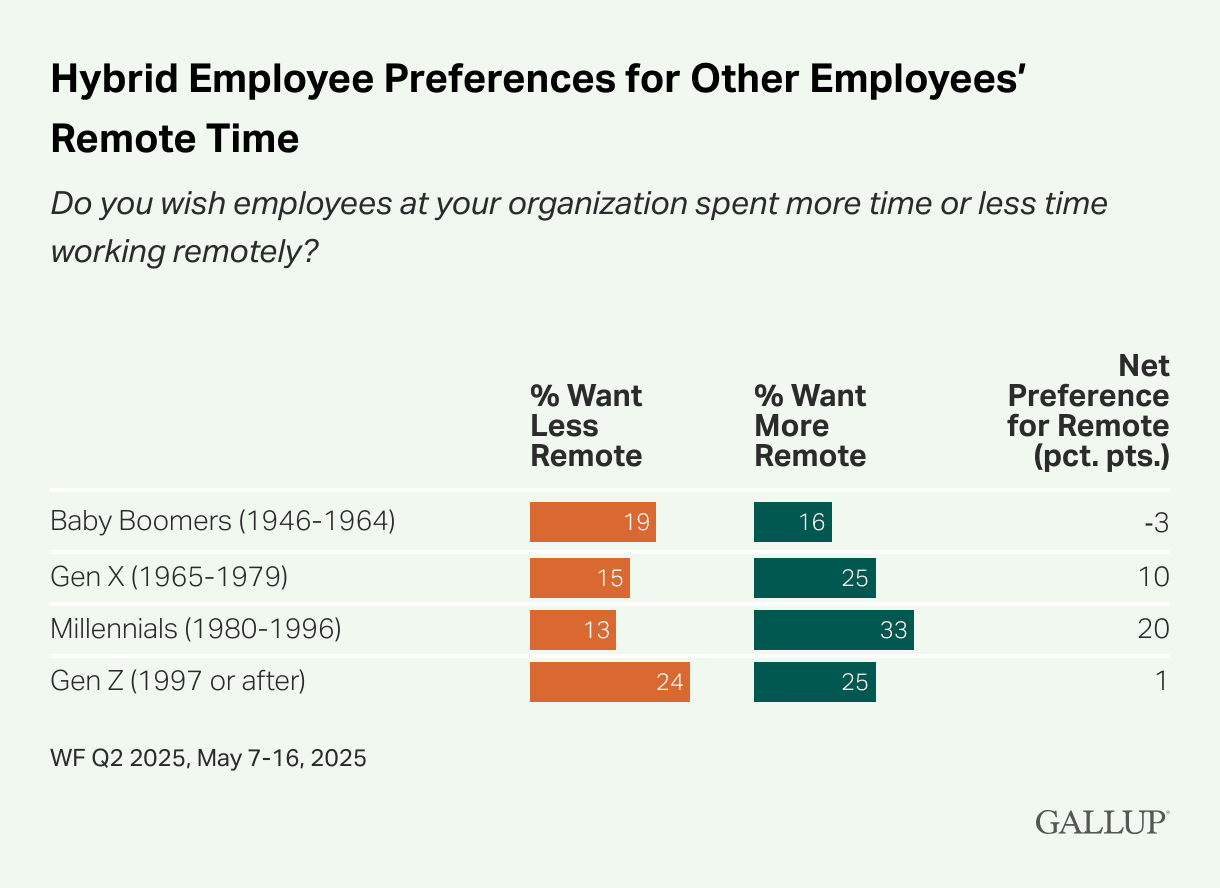

Even as the battle between in office and remote work rages on, recent Gallup research has shown that younger workers are least enthusiastic about remote work – with only 23% saying they want to work exclusively remote vs. 35% of older workers. In fact, when asked about how they want others in their organization to work, Gen Z was more negative than Baby Boomers about remote work for others.
Much has been written about the ongoing impact of remote work on careers for junior employees, who have potentially missed out on informal relationship building and access to a wider array of meetings and opportunities. Data such as Gallup’s show that this audience may be quite aware of the cost of remote work on their career, and with less lifestyle obligations on average than older audiences – isn’t as comfortable with the trade off.
// Ads You Might Have Missed:
1.) ‘Thank You For Your Interest in Astronomer’ – Astronomer:
While it seems like everyone, from people to brands, weighed in on ‘Coldplaygate’, where the CEO and Head of HR for tech company Astronomer were caught in an affair on a Coldplay concert kiss-cam – one voice has been quiet, the company itself. Outside of traditional statements and actions to remove the CEO, data workflow company has been safely silent – until now.
A video released this week shows ‘temporary spokesperson’ Gwenyth Paltrow (aptly the ex-wife of Coldplay singer Chris Martin) answering the questions, everyone didn’t want to know, about the company. Avoiding ‘what the hell’ and ‘how’s your social team holding up’ for answers about their data workflow offering and upcoming analytics conference.
While we wrote last week about the risk of brands ‘punching down’ by shaming people in controversies like this, Astronomer has the unique position of being unintentionally involved and balances the different elements of this effectively. From a sense of humor about it, to the time spent waiting to respond, the brand shows how to speak up for itself without tearing down those involved and in the process, potentially win over the fraction of the audience who might be actionable customers.
2.) ‘Protest From Home’ – Carer’s Trust:
Protests create visibility that’s hard to avoid, but what happens when the issue affecting a group keeps them from actually gathering? To raise awareness of the challenges facing unpaid carers in the UK, where 44% report no access to respite care, Uncommon and Carers Trust have used digital screens to gather those who couldn’t be there in person. ‘Protest From Home’ features carers from around the UK holding placards on digital screens deployed around Parliament – taking the traditional protest and distributing it.
The absence of physical protesters underscores the scant amount of time many carers have off and turns the factor that limited visibility into something that reinforces their message.
3.) ‘When Everyone Has the Same Phone’ – Samsung:
Samsung has long known that one of Apple’s greatest strengths is also a major weakness. In becoming the ubiquitous tool for creativity, Apple simultaneously empowers creativity and individuality in its devices, while risking a sense of sameness through being the ‘default’ choice. Its advertising aims to keep the brand in front of this contradiction, but Samsung New Zealand’s latest campaign puts it at the forefront.
Asking what happens ‘When Everyone Has the Same Phone?”, black sweatered Steve Jobs-esque characters are holding hands with everyone, until one person uses a Samsung flip phone. The individuality conundrum that Apple faces is picked at subtly in the ad, with Samsung careful to not directly shame Apple users as directly as previous iterations. Instead, it offers an open question that hopes to sow doubt – asking if your phone needs to be unique or just what you do with it?
4.) ‘Side Mission’ – McDonald’s UK:
McDonald’s latest UK campaign adopts the language and aesthetic of gaming to reframe a trip to the golden arches as a side mission / side quest. For those that haven’t ground their way through a video game, side missions are objectives separate from the main game narrative that often give different items or information (Final Fantasy is never giving my time back for those). Drawing on video game cues from Age of Empires through to Mortal Kombat and Dance Dance Revolution, the campaign puts McDonald’s as a side quest to everyday life, something its ubiquity around the country enables effectively.
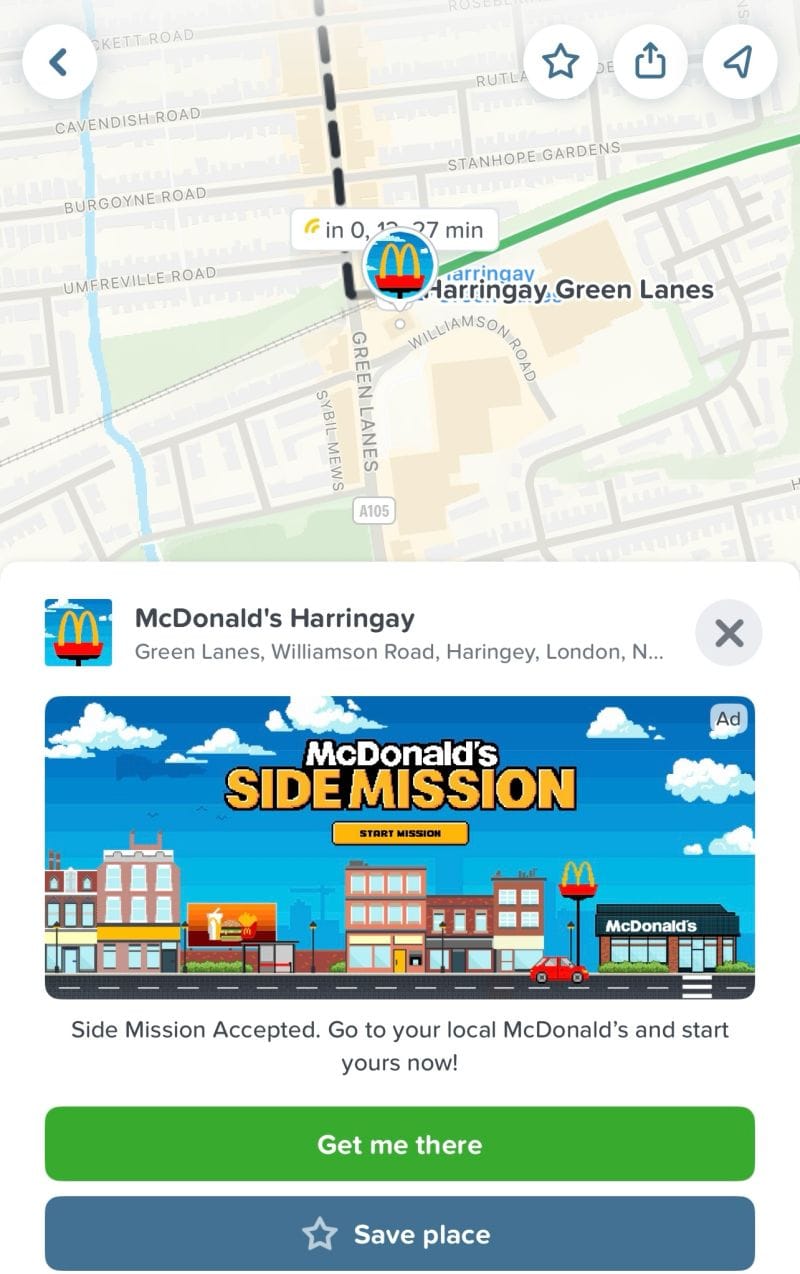

Most interestingly though, is their support of the main campaign through CityMapper ads. If you’re planning a journey near a McDonald’s, the app promotes a stop for a ‘side mission’, making the chance of actually taking on the quest much higher.
// Sunday Snippets
// Marketing & Advertising //
// Miracle-Gro goes ‘full bush summer’ in a gardening campaign rife with double entendres [Ads]
// UK Auto Assistance firm ‘Green Flag’ takes ‘stay with the car’ to a new level in its latest ads [Ads]
// Deutsche Telecomm use a music video to talk about the dangers of digital identity theft [Ads]
// American Eagle’s partnership with actress Sydney Sweeny has sparked interest and a ‘meme stock’ rally [Brands]
// Buxton Water and Charity MIND have partnered to make the first ‘Venting Machine’ [Ads]
// Doublemint Gum and the Gift of Life Marrow Registry have partnered to use chewing gum to donor drive registration [Ads]
// Didi shows people what a ‘big night out’ with rideshare can be – all soundtracked by a flute [Ads]
// Amazon’s latest ad for its core books business shows that without readers, a book doesn’t really exist [Ads]
// LEGO takes a page out of Nintendo nostalgia to launch its ‘lego’ game boy – ‘Now You’re Playing with Brick’ [Video Games]
// Are campaign phases irrelevant? Pollyanna Ward makes a strong case for rethinking how we comms plan [Strategy]
// Restaurants go nostalgic with retro-themed pricing deals [Retail]
// Technology & Media //
// Google launches the beta of a Make / n8n style AI tool with Opal [AI]
// An AI deepfake startup breaks down the progression and state of deepfakes [AI]
// Why is airplane Wi-Fi still so bad? [Technology]
// A history of South Park’s different controversies [TV]
// Apple consolidates its device insurance offering into AppleCare One [Technology]
// Life & Culture //
// Tired of ghosting job candidates? Colby Black has launched the ‘Ghosting Buster’ to help candidates get any feedback [Work]
// The estate of painter Bob Ross and Topps baseball have partnered to make another round of ‘The Joy of Baseball’ Cards [Sports]
// McDonalds is moving further into cold brews and dirty sodas to find extra revenue in beverages [Food]
// Chili’s and Tecovas partner to make cowboy boots from the restaurant brands’ leather seats [Fashion]
// Are we seeing the return of the ‘meme stock’? [Finance]
// Ground Beef prices are soaring in the US [Food]
// The launch of the ‘Fantastic Four’ saw the $80 Galactus popcorn bucket sell out in seconds [Food]
// With no UK locations, how have grocer Trader Joes’ bags become a London staple? [Fashion]
// So Mario and Princess Peach were just ‘good friends’ this entire time? [Gaming]
// Until Next Sunday
As always, let me know what you think by email (dubose@newclassic.agency), website or on LinkedIn.
You can also listen to an audio summary and discussion of each week’s newsletter on Spotify. We’re also on TikTok!
